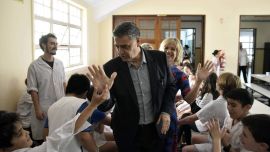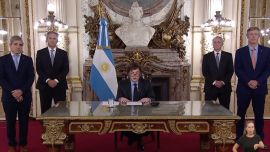Bolivia is set to shift back to the left after Luis Arce, the candidate of former president Evo Morales’ Movement to Socialism (MAS) party, emerged as the clear winner of last weekend’s general election.
Despite fears of fraud and a violent reaction to the result, Bolivia’s presidential election passed off without major incident, with only small demonstrations on the streets. On Wednesday, international observers declared the election to have been transparent and Arce's incoming leftist government legitimate, as a near-complete tally of results showed an overwhelming victory for Morales' former protégé.
The findings are a sharp difference from 2019 elections, when Morales won an unconstitutional fourth term in polls that sparked weeks of protests, leaving 36 dead and 800 wounded. A later audit by the Organisation of American States (OAS) found clear evidence of fraud.
"People voted freely and the result was clear and overwhelming, granting strong legitimacy to the incoming government, to Bolivian institutions and the electoral process," Manuel González, head of the observer mission for the OAS, said in releasing the team's preliminary report.
Bolivia's electoral tribunal on Friday published official results from the ballot, confirming Arce's landslide victory. With all ballots now counted, Arce finished with 55 percent of the vote, meaning he won with no need for a run-off.
Centrist former president Carlos Mesa, who conceded defeat on Monday, polled just under 29 percent, with right-wing conservative Luis Fernando Camacho taking 14 percent.
Electoral Tribunal president Salvador Romero said Arce and the newly elected Congress would assume their functions in the first half of November, without specifying an exact date.
It was a stunning result, as opinion polls leading up to the election had predicted Arce would come out on top but not garner enough votes to avoid a run-off.
Despite the coronavirus pandemic, a record 88 percent of Bolivians voted, according to the Supreme Electoral Tribunal.
"Thanks to the audit report carried out after last year's elections, today the country has an independent electoral authority and had a more equitable and transparent contest," said González, a former foreign minister of Costa Rica.
The TSE was due to announce the result of the full official recount at press time.
Arce's rivals also recognised his victory, including Mesa and interim president Jeanine Áñez, a fierce critic of Arce's leftist MAS party and of ex-president Morales, who is currently in exile in Buenos Aires.
In addition to the OAS findings, the results were in line with projections from two private polling firms on the night of the election.
The European Union and US-based Carter Center also sent missions to observe the vote.
The Bolivian Constitution declares the candidate who obtains an absolute majority or 40 percent of the vote with a 10-point advantage over their nearest challenger as the winner in the first round. Otherwise, there must be a second round.
Despite that, hundreds of Bolivians have protested in Santa Cruz, a right-wing bastion, and in the central city of Cochabamba, claiming fraud in Arce's win and opposing Evo Morales’ return to the country. A crowd also gathered to protest in the capital La Paz.
Architect
Arce was credited as the architect of Bolivia's economic miracle under Morales, who became the country's first indigenous president in 2006. Over the next decade, Arce slashed poverty levels and modernised the nation's infrastructure, boosted by demand for Bolivia's natural resources.
The election, twice postponed due to the coronavirus, was the first in 20 years not to feature Evo Morales, who resigned and fled into exile after the 2019 protests.
An interim administration was set up, led by right-wing senator Áñez. She withdrew her candidacy for the presidential vote shortly before the election.
Morales, currently in Buenos Aires, said this week he intends to return to Bolivia as soon as he can, though he admitted on Wednesday that any trip “was not yet scheduled.”
He faces arrest on terrorism charges after the right-wing interim government accused him of directing anti-government protests from exile. The indigenous leader is also being investigated over allegations of "rape and trafficking" of underage girls.
He dismisses the accusations, saying they were "part of a dirty war" waged against him.
Morales has called on his fellow citizens to maintain unity and says that the margin of victory is proof that there was no fraud in the October 2019 vote. He then took aim at the head of the OAS, calling for him to step down.
"If Luis Almagro had some ethics and morals, he should resign from the OAS," Morales declared, saying he held the former Uruguayan leader "responsible for the coup."
– TIMES/AFP/AP
























Comments